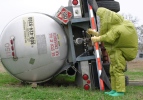Navy mandates the use of new assessment tool, co-developed with Battelle, in feasibility studies at all of its remediation sites.

U.S. Geological Survey and Michigan State University study applies NOAA models to determine the pathways of contaminants and indicator bacteria.
EPA, the Department of Housing and Urban Development, and the U.S. Department of Transportation will provide sustainable design assistance to Boston, Jefferson City, Hartford, Charleston and Little Rock.
Global Water Intelligence predicts the industry will not exceed its 2007 performance of 7.5 million cubic meters per day until 2012.
The company's technology turns wood chips and algae into methane and organic fertilizer.

Recommendation #6 from the Chemical Emergencies Work Group supports a bill using an approach to inherently safer technologies (IST) that the U.S. chemical industry opposes.
EPA and other panelists will discuss technical tools and support to local watershed groups.
The InterAcademy Council, an Amsterdam-based organization, says the International Panel on Climate Change should establish an executive committee with an executive director to strengthen its procedures.
This tool introduces water utilities to the potential impacts of climate change.
University of California Davis scientists said that most of the antibiotics used to treat dairy cows generally degrade in the top 12 inches of soil.

New positions, recognition and calls to service top this week's summary of movement within the environmental industry.
The agency has set the new deadline for Oct. 13 on the revisions to the total coliform rule.

The catalyst has been licensed to Sun Catalytix, which envisions developing safe, super-efficient versions of the electrolyzer, suitable for homes and small businesses, within two years.
A new report from the Center for American Progress and EnergyRM indicates that a robust program of smart policy incentives and investments could make a big difference for businesses looking to invest in the growth of clean energy jobs.
The Institute for Southern Studies report says the federal government still hasn't properly responded to the problems on the Gulf Coast caused by Hurricane Katrina.
Long-standing pesticide faces government review, an activist campaign, and two lawsuits.
The Innovative Sanitation as a Business Program grant will support solutions in Africa, Asia, and Latin America.
In a cooperative research and development agreement, the team will try to increase the effectiveness of the municipal drinking water distribution network for delivery of better quality water while using less energy.